
Index |
Next |
Prev |
Australian Folk Music
2:00pm, Sunday, April 3, 2011
Current mood: nauseous ![]()
Unlike most Australians, I grew up with a fairly thorough grounding in traditional Australian folk music. Of course, all Australians grow up with "Waltzing Matilda", "Botany Bay" and "Click Go The Shears". And also, in my day, ABC's weekly "Singing & Listening", which was broadcast into all primary classrooms, had a nice sprinkling of other gems such as "Four Little Johnny Cakes", "Flash Jack From Gundagai" and "Andy's Gone With Cattle". So that others of my generation, if they could remember them, might know up to 10 of these treasured classics. However, unlike most other children of my generation, I had a mother who was interested in Australian history, and she kept my brother and I exposed to our musical folk heritage from the beginning, with such collections as "Reedy River", "The Restless Years" and later on, the recordings of Alex Hood and the Bushwackers. So it was that I absorbed much of the folk repertoire of this country as a child, including many of the less well known songs such as: "Look Out Below", "Bluey Brink" and "The Old Bullock Dray".
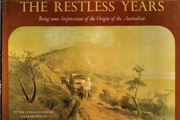
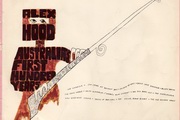
Two of the Australian folk albums I grew up with: The Restless Years (various artists) and Alex Hood's: Australia's First Hundred Years.
When, at the age of 21, I went to my first Port Fairy Folk Festival, I was SHOCKED to find that everyone was playing Irish music and that there was virtually no Australian folk music to be heard anywhere! "But this is Australia!" I cried, "Where's our own music? We've got a great tradition. Why aren't you playing it?". Yes, it was quite a shock, and I've got to say, things haven't improved since then.
![]()
I'm not deriding the Irish tradition, nor the Scottish, I've embraced them, learnt a good bag of them, played numerous sessions, had many a great time with them and love them wholeheartedly, but Australian songs and tunes are rarely heard, especially here in Victoria, which is really sad. On my return from Great Britain last year, I began to value Australia a little more and I decided to do something about it.
![]()
I decided to collect all the Australian folk music recordings I could find, and to transcribe, massage and arrange EVERY Oz folk song of decent quality. This means that I had to go through the various versions of each song to find the best melody, then check the chords to make sure that they were the best harmonisation, I had to check and correct the words to ensure that they were comprehensive yet succinct, and as historically accurate as possible without killing the story, finally I had to find a key for the song that would suit my voice and sound RIGHT.
Fortunately I had the resources of the internet to help speed the process considerably, and a number of websites were of great value:
- Australian Folk Stream which has a good collection of songs, (no chords), although they are often not the best melody. After each song is a short annotation detailing who collected the song, who wrote it (if known), and explaining the background to the words and any slang within it. First class resource for the serious researcher.
- The Mudcat Cafe which is THE largest folk music resource on the net, containing multiple versions of songs and tunes and lengthy discussions on same. It's a rather chaotic meeting place, with folklorists of vast experience mixing with newbies and dabblers, still... if you wade through waffle you will find many gems of knowledge that you won't find anywhere else.
- Australian Folk and Bush Music and Musicians is a blog containing a vast raft of information on recordings of Australian folk music and often download links to the recordings themselves! Kudos to Paul the Stockman and his contributors!
Incidentally, no Australian folk song archive is complete without a mention of Albert L Lloyd and John Meredith, who collected many songs and led the Oz folk revival of the 1950s. Without the efforts of these two men the music of this country would be considerably poorer. So it's gratitude and kudos from me guys. Well done and thank you!
![]()
One of the critical considerations in this undertaking was: "What is an Australian folk song?". Other compilers are less particular than me and just include anything that refers to Australia... not I! To be included in my collection a song must not only be about Australia, it must also a) sound Australian and b) sound like folk music.
- Songs in the dominant mode are commonplace in the Celtic tradition, but NOT, in the Australian tradition. For this reason, "Van Diemen's Land" in it's normal setting is OUT, even though by its subject matter it should be in.
A song in the dominant mode is one where the key note appears to be a fifth higher than the true key note. Such a song might start with a G major chord and alternate with a C major and an E minor and you might be halfway through the song before the appearance of an F major alerts you to the fact that it is not in the key of G after all, but rather, in the key of C. - Folk music is not limited to any particular era, rather, it is a style of music that people instinctively recognise as folk music. Folk music is always something that can be sung unaccompanied by ordinary people. It always has a strong rhythm, strong melody and strong words, that ordinary people can easily grasp, remember and join in with. It's rhythm may be that of a jig, slide, polka, waltz, reel or 4/4 ballad, but it is NOT heavily syncopated. Most notes are on the beat and the stress is normally on the first beat of the bar.
It is manifestly NOT rock music, which is usually heavily syncopated and lacking in melody: "Eagle Rock" is certainly a classic Australian song, but it is not a folk song because it cannot be readily sung unaccompanied. Go ahead and try it and see how far you get. Same goes for "Living In The Seventies", "Khe Sanh" and the great majority of all rock music.
Nor is it reggae, which emphasises the off beats and syncopates heavily. Such music is completely dependant on a strong recorded rhythm section to carry the beat and keep the song in motion. Take away the backing and the song collapses. Folk music must be able to carry itself on the melody alone. - Folk music lyrics should be about everyday life: things the ordinary person can relate to immediately. Such things include: work, friends, family, places, animals, folk heroes, war, sport etc.
Folk music, (especially Australian folk music), does not generally include love songs. There may well be the thread of love inside the song, such as: "Andy's Gone With Cattle" or "Reedy River", but the song should, at least ostensibly, be about everyday life. If the song includes the sentence: "I love you.", it's probably out.
Folk music lyrics should not be about religion. Such a topic is divisive and boring to the majority of Australians and should be avoided altogether.
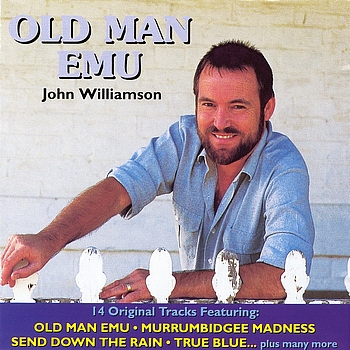
John Williamson: Australia's greatest folk balladeer of the last 40 years
When I had finished my self-appointed task, I found I had 53 great Australian songs, which included not only the old classics mentioned above, but also some modern gems like: "Redback On The Toilet Seat", "Only Nineteen" and "Old Man Emu". I left out quite a few old songs that appear in other collections, mostly because they weren't musically unique or of a high enough standard, but there were also quality examples, excluded for other reasons, such as: "Van Diemen's Land" as detailed above, and "The Black Velvet Band", because it only mentions Australia, it's not about it.
Looking back now, I can see that there are a few more modern ones that could go in, such as "Up There Cazaly" and "My Island Home", but they can wait. No doubt I have also overlooked some quality old classics, simply because I haven't heard everything, but they can go in as and when I become aware of them.
So I now have 53 classic Australian folk songs in quality, computer-formatted musical notation, arranged to suit my voice accompanied by an acoustic guitar. The question arises: What am I going to do with them? Well, it's a damn good question, and I would have to say that at this point I don't know... Possibilities include: starting a bush band, making some recordings and publishing the sheet music on my web site. Stay tuned to see what happens...
The question of starting a bush band begs the question: What IS a bushband? Well, I believe the Wikipedia article has it pretty right, the essentials are a tea chest bass, guitar, bodhran and lagerphone for the rhythm section, and any of fiddle, banjo, mouth organ, tin whistle and concertina for melody obbligatos. One or more strong voices are also required and for the aboriginal touch: a didgeridoo and some clap sticks are superb for certain songs.
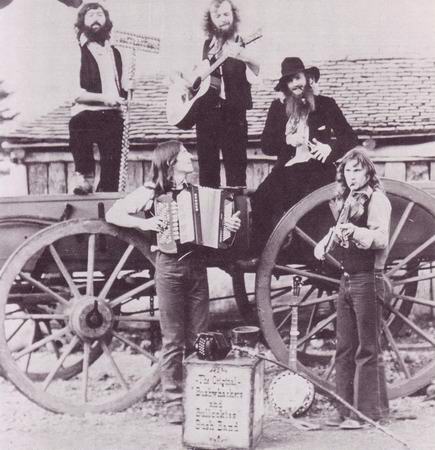
Perhaps the greatest bush band of all: The Bushwackers in 1971
The Australian bush band is different from other folk ensembles, just as true Australian folk music is different from that of other countries. You can talk about our Celtic heritage and the roots of our melodies, but the fact is: Australian music just sounds different, and is instantly recognisable as Australian. Not only does it have its own twang and lilt, but it also has its own distinctive instrumentation: Where else do you hear the bush bass, lagerphone and didj? Furthermore, there is something about the Australian folk harmonica that distinguishes it from all the other harmonica music throughout the world. Listen to an Australian solo mouth organ playing "The Ballad Of Ben Hall" in C, and you can picture yourself out there in the bush with your billy on the fire and the hot sun low in the sky over the scrub...
While on the subject of unique Australian instrumentation I should mention that I was inspired during all this to build myself a lagerphone! Yes, other countries have things that are similar, but they are not quite the same and nor are they so quintessentially part of that country's folk lore. Nothing says "Oz Folk" more than a lagerphone!
I love it that lagerphones are not made commercially. If you want one you must build it yourself! And this means that not only is each one different, but each one embodies the character of the person that designed and built it. Just fantastic! My own followed existing principles but I also did my own experimentation during the design phase, and as a result my cross pieces are rotated at 90° to the conventional alignment. This gives much greater rattle on the down stroke! Viva Mars Technology!
![]()
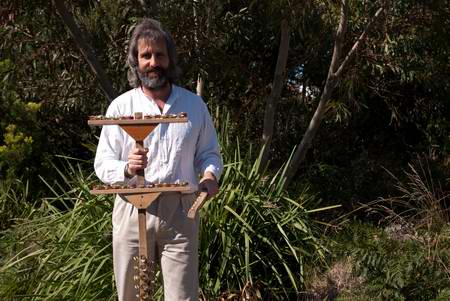
The author and his newly built lagerphone!
Finally: Surely I don't need to mention that Australian folk songs should usually be sung in an Australian accent! The exception being immigrant songs such as Botany Bay, Jim Jones, Dennis O'Reilly etc. This doesn't mean that the strongest, thickest Strine is necessarily best. It's horses for courses, but no one wants to hear "The Woolloomooloo Lair" sung with an Irish or American accent.
Just as an aside here: I find it strange that so many young Australians today find it hard to sing with an Australian voice. I mean, they talk with the accent, so why can't they sing with the accent?...
![]()
I blame the mass media!
Currently reading:
Making Money by Terry Pratchett